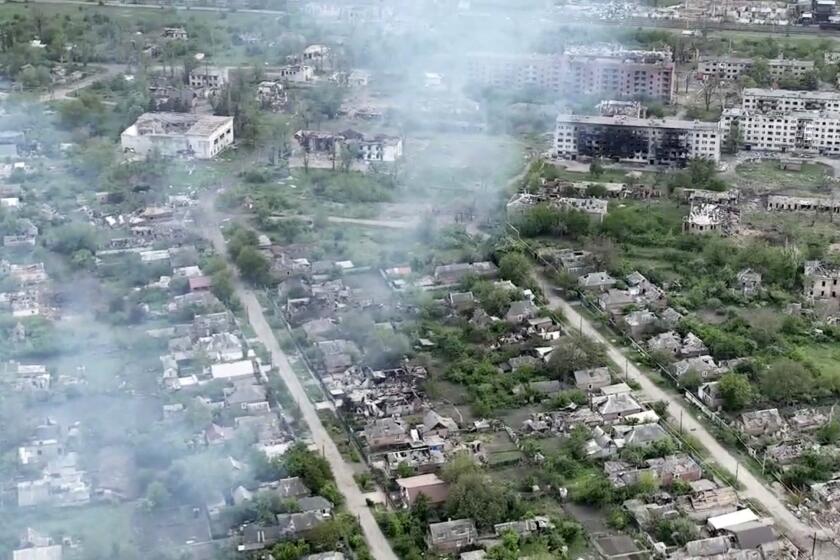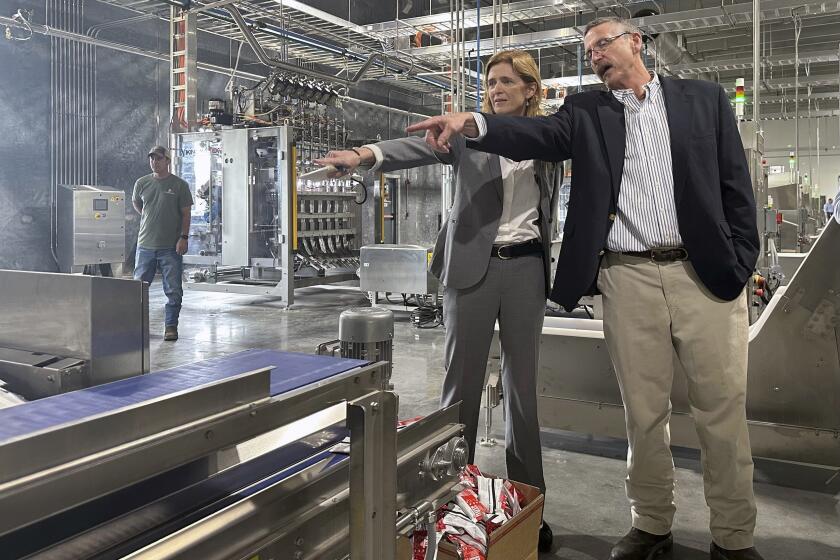Church Leads Protest in Spain
Making an unusually forceful foray into Spanish politics, the Roman Catholic Church led an enormous march through the streets of Madrid on Saturday to protest legislation that would legalize marriage for gay couples.
Priests wearing their collars, nuns in gray habits and adults and children from all over the country converged on downtown Madrid. They waved placards declaring, “Marriage = Man and Woman,” and applauded Cardinal Antonio Maria Rouco Varela, the archbishop of Madrid, who walked near the front of the noisy crowd.
“This demonstration is not a reaction. It is not against anyone. We’ve come to say yes to the family unit as composed by man and woman,” said Jesus Sanz, the bishop of Huesca, who traveled five hours by bus to reach the rally.
Right-wing politicians also joined the demonstration, which was organized by a coalition called the Forum for the Family. It was the most coordinated protest to date against the agenda of Socialist Prime Minister Jose Luis Rodriguez Zapatero.
The gay marriage measure is one of several social policies that have heightened tensions between the Catholic Church and Zapatero’s government, which came to power a year ago in an upset electoral victory that ended eight years of conservative rule.
Zapatero also plans to relax restrictions on abortion, divorce and stem cell research. And he has focused on the church itself, which receives public funding in Spain. His government has proposed reducing the church’s budget and extending financial benefits to other religions.
Individual priests and bishops in Spain have at times spoken out against violence by Basque separatists and on other issues, but Saturday marked the first time in more than two decades that the Catholic hierarchy mobilized people to take to the streets -- and joined them. In 1983, the church similarly fought an earlier Socialist government’s decision to legalize abortion.
Some on the left bemoaned what they saw as a flashback to the days of longtime dictator Francisco Franco, who outlawed homosexuality. The church hierarchy, which was closely allied with him, was extremely powerful until his death in 1975.
“They want to revive Catholic nationalism,” Beatriz Gimeno, president of the Federation of Gays, Lesbians and Transsexuals, said at a news conference Saturday. “They are not in favor of the family but in favor of a certain, excluding kind of family.”
But the Spanish Bishops Conference said the “extreme” nature of the gay marriage legislation and the “unique” threat it posed to humanity prompted the group to take extraordinary action.
“In its 2,000 years of life, the Catholic Church has never come across anything like it,” said conference spokesman Father Juan Antonio Martinez Camino in announcing the group’s backing of the rally. “This law does things that no other law in the world does. It eliminates the figure of the man, of the woman, of the husband, the wife.”
The law would be one of the most liberal marriage statutes in Europe. It would grant full marriage rights to same-sex couples, including the right to adopt children. It has been approved by the lower house of parliament and is expected to pass the Senate in the next few weeks. Polls have shown a large majority of the Spanish public favors allowing gay marriage.
Judging from Saturday’s protest, the adoption clause may be the most controversial. Demonstrators hoisted posters depicting a youngster with the words “I am a child, not an experiment.” A waist-high boy held a sign almost lost in the crowd that read, “Zapatero had a mother and a father. Why can’t I?”
“Homosexuals are human beings with a right to form a couple but nothing more,” said Adela Rodriguez, a 55-year-old nurse from Madrid. “Don’t touch the children!”
Pilar Gonzalez-Valerio, a 37-year-old executive secretary, marched with her husband and their 7-year-old son. “Matrimony is between a man and a woman,” she said. “You can’t distort or break down such a fundamental concept, which is the basis of all societies.”
Natividad Nunez Barciena, 68, said her 70-year-old brother was gay but that he also opposed same-sex unions because he was a good Catholic who “recognizes that matrimony is a sacrament of God.”
In addition to Madrid’s cardinal, 18 bishops were reported to have taken part in the rally. Estimates of the size of the crowd varied wildly, with police putting it at nearly 200,000 and organizers saying more than 1 million participated.
The actions by the Spanish prelates were in keeping with the new papacy of Benedict XVI, who has said the church must more boldly wage political and social fights to protect Christian values from secularism and permissiveness. The Vatican has called the Spanish legislation iniquitous.
With Benedict’s endorsement, Italian bishops last week helped defeat a measure that would have liberalized strict fertility laws. The referendum was a victory for the Vatican even as many people in Western Europe seem to be turning their backs on traditional Catholic worship.
“We are seeing a shift ... clearly historic ... in the church’s way of acting within society,” commentator Cesar Alonso de los Rios noted in the conservative Spanish newspaper ABC. “I think the Spanish church has begun to use this new style of defending its principles -- clearly and without concessions -- as [the pope] asked.”
*
Times staff writer Wilkinson reported from Rome and special correspondent Moffett from Madrid
More to Read
Start your day right
Sign up for Essential California for news, features and recommendations from the L.A. Times and beyond in your inbox six days a week.
You may occasionally receive promotional content from the Los Angeles Times.







